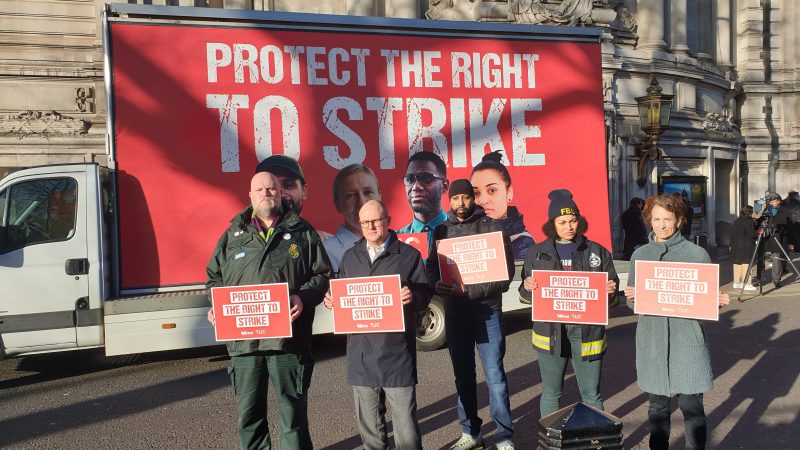The controversial strike reforms have suffered more defeats in the House of Lords. The government has promised to overturn the latest Lords’ amendments.

Prem Sikka is an Emeritus Professor of Accounting at the University of Essex and the University of Sheffield, a Labour member of the House of Lords, and Contributing Editor at Left Foot Forward.
Since the 1970s a key aim of the right-wing coup has been to smash trade unions and workers’ rights, so that big corporations and the rich can grab a bigger share of the gross domestic product.
The UK government has enacted a series of anti-trade union laws. Workers’ share of gross domestic product, in the form of salaries and wages has been forced down from 65.1% in 1976 to around 50% now. To prevent protests against falling living standards, “noisy” protests, even by one person, have been criminalised. The Public Order Act 2023 bans “disruptive” protests, authorises polices to stop and search people without any suspicion on the basis that they might join a protest.
After decades of struggles, workers secured the right to withdraw labour and persuade employers to renegotiate pay and working conditions. This is recognised as a fundamental human right and is part of international law. But this is being swept away by the Strikes (Minimum Service Levels) Bill.
The Bill has been passed by the House of Commons, after perfunctory scrutiny. It has been resisted by House of Lords and peers have made a series of amendments. The government has overturned the amendments. Yesterday, the Lords again rejected key elements of the Bill.
The Bill empowers Ministers to specify minimum service levels (MSLs) when a strike is called in health services; fire and rescue services; education services; transport services; decommissioning of nuclear installations and management of radioactive waste and spent fuel; and border security. The Ministers will order employers to act upon the MSLs. In making MSL orders, the Minister can unilaterally change any relevant law. No parliamentary approval for MSLs is needed and they can’t be challenged in courts.
Upon receiving the MSL orders employers must name the employees, which can include shop stewards and strike organisers, who must cross the picket line to deliver MSLs. There is no obligation on the employer to inform the selected employee. That task is given to trade unions who must ensure that the named individuals break the strike. Those refusing can be sacked with no right to appeal. If trade unions are found to be wanting they can be sued by employers for damages, and ultimately face bankruptcy.
The protection against sack is removed once an employer names an employee to break the lawfully organised strike. This is effectively legalised conscription.
MSLs determined by a Secretary of State could be for 100 percent of the service and require staffing levels to match. Many will not be able to take strike action. For example, railways cannot function without signallers; airlines can’t function without pilots and air-traffic controllers. So, they can’t take industrial action. In schools, each class must have a teacher. So, teachers cannot go on strike. The key point is that many specialised workers will not be able to take industrial action, effectively condemning them to low pay and poor working conditions.
The Bill bans strikes. There are no matching constraints on employers to prevent withdrawal of capital even though that causes disruption to economy and communities. The governments does not specify MSLs that people can expect from railways, water, banks, healthcare, insurance, energy, supermarkets and other industries.
The Bill could also trigger a constitutional crisis. Conservatives have never been keen on devolved governments in Scotland and Wales, which are currently governed by the Scottish National Party (SNP) and Labour Party. They have often resisted diktats from London.
The devolved governments have statutory responsibility for healthcare, education, transport and fire and rescue services. But the Bill empowers a Minister in London to set MSLs for Scotland and Wales and instruct local employers, which could be the devolved governments, to implement the work orders. So, a Minister in London will make rules about the number of buses, trams, trains, ambulances, yoga classes, abortion clinics, acupuncture sessions, fire engines, doctors, nurses and teachers which must be forced to work in Scotland and Wales, even though s/he has no jurisdiction over the devolved nations. This is bound to create tensions and accelerate break-up of the UK.
The above issues have been debated in the House of Lords, and the government has used its big majority in the Commons to overturn the previous Lords’ amendments. Yesterday, the government was defeated in the Lords over three main issues. Firstly, striking workers must not be sacked for taking strike action they voted for. Secondly, trade unions must not be required to force their members to break strikes. Thirdly, every aspect of the law, including MSLs, must be subject to consultation and parliamentary scrutiny.
The Bill now returns to the Commons. The government has promised to overturn the latest Lords’ amendments. However, the Bill lacks details and is likely to be a legal minefield. For example, how are trade unions to ensure that the named employee works even though s/he may not wish to? Will trade unions need to drag and supervise the worker? Will trade unions be deemed to be responsible for health and safety of such workers? The Labour Party has promised to repeal the legislation, if it wins the next general election.
To reach hundreds of thousands of new readers and to make the biggest impact we can in the next general election, we need to grow our donor base substantially.
That's why in 2024, we are seeking to generate 150 additional regular donors to support Left Foot Forward's work.
We still need another 124 people to donate to hit the target. You can help. Donate today.



